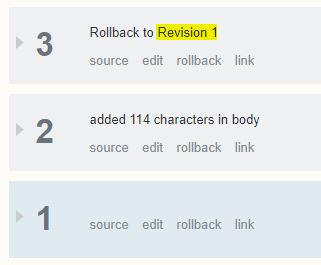When you look at a post's edit history you can see each version of the question going back to the original version. Each version has a number next to it, starting with 1 for the original version. On the mobile app, the original version has an additional identifier next to the "1". It says "Initial Revision". As far as I can tell this label does not appear on the actual Stack Exchange sites.
Why would the original version be called "initial revision" if the original version was not a revision?
Here is an example from a recent question.
This is how the edit history appears on the site:
And this is how it appears on the mobile app:
The app screenshot is from version 1.6.6.2 if that makes a difference.
There are, apparently, circumstances in which the original post is referred to as a revision even on the website itself. For instance, if someone rolls back an edit to restore the original version, the edit history displays it as "Rollback to Revision 1" as in the below screenshot (taken from this question):



